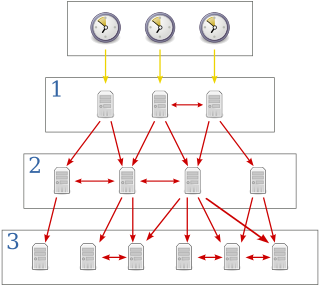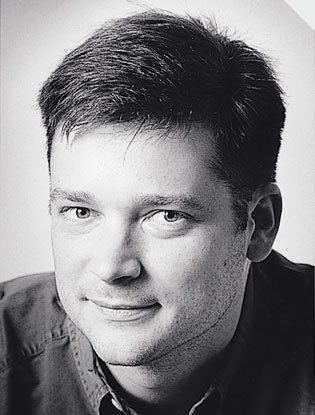
Plan 9 from Bell Labs is a distributed operating system which originated from the Computing Science Research Center (CSRC) at Bell Labs in the mid-1980s and built on UNIX concepts first developed there in the late 1960s. Since 2000, Plan 9 has been free and open-source. The final official release was in early 2015.

rsync is a utility for transferring and synchronizing files between a computer and a storage drive and across networked computers by comparing the modification times and sizes of files. It is commonly found on Unix-like operating systems and is under the GPL-3.0-or-later license.

In computer science, inter-process communication (IPC), also spelled interprocess communication, are the mechanisms provided by an operating system for processes to manage shared data. Typically, applications can use IPC, categorized as clients and servers, where the client requests data and the server responds to client requests. Many applications are both clients and servers, as commonly seen in distributed computing.

The Network Time Protocol (NTP) is a networking protocol for clock synchronization between computer systems over packet-switched, variable-latency data networks. In operation since before 1985, NTP is one of the oldest Internet protocols in current use. NTP was designed by David L. Mills of the University of Delaware.

David A. Wagner is a professor of computer science at the University of California, Berkeley and a well-known researcher in cryptography and computer security. He is a member of the Election Assistance Commission's Technical Guidelines Development Committee, tasked with assisting the EAC in drafting the Voluntary Voting System Guidelines. He was also a member of the ACCURATE project.
The Apple Filing Protocol (AFP), formerly AppleTalk Filing Protocol, is a proprietary network protocol, and part of the Apple File Service (AFS), that offers file services for macOS, classic Mac OS, and Apple II computers. In OS X 10.8 Mountain Lion and earlier, AFP was the primary protocol for file services. Starting with OS X 10.9 Mavericks, Server Message Block (SMB) was made the primary file sharing protocol, with the ability to run an AFP server removed later in macOS 11 Big Sur. AFP supports Unicode file names, POSIX and access-control list permissions, resource forks, named extended attributes, and advanced file locking.
The Berkeley r-commands are a suite of computer programs designed to enable users of one Unix system to log in or issue commands to another Unix computer via TCP/IP computer network. The r-commands were developed in 1982 by the Computer Systems Research Group at the University of California, Berkeley, based on an early implementation of TCP/IP.
Clock synchronization is a topic in computer science and engineering that aims to coordinate otherwise independent clocks. Even when initially set accurately, real clocks will differ after some amount of time due to clock drift, caused by clocks counting time at slightly different rates. There are several problems that occur as a result of clock rate differences and several solutions, some being more acceptable than others in certain contexts.

The history of Unix dates back to the mid-1960s, when the Massachusetts Institute of Technology, AT&T Bell Labs, and General Electric were jointly developing an experimental time-sharing operating system called Multics for the GE-645 mainframe. Multics introduced many innovations, but also had many problems. Bell Labs, frustrated by the size and complexity of Multics but not its aims, slowly pulled out of the project. Their last researchers to leave Multics – among them Ken Thompson, Dennis Ritchie, Doug McIlroy, and Joe Ossanna – decided to redo the work, but on a much smaller scale.

David Pope Anderson is an American research scientist at the Space Sciences Laboratory, at the University of California, Berkeley, and an adjunct professor of computer science at the University of Houston. Anderson leads the SETI@home, BOINC, Bossa, and Bolt software projects.
Scott J. Shenker is an American computer scientist, and professor of computer science at the University of California, Berkeley. He is also the leader of the Extensible Internet Group at the International Computer Science Institute in Berkeley, California.
M. Dale Skeen is an American computer scientist. He specializes in designing and implementing large-scale computing systems, distributed computing and database management systems.
Özalp Babaoğlu, is a Turkish computer scientist. He was professor of computer science at the University of Bologna, Italy until 2022. He received a Ph.D. in 1981 from the University of California at Berkeley. He is the recipient of 1982 Sakrison Memorial Award, 1989 UNIX InternationalRecognition Award and 1993 USENIX AssociationLifetime Achievement Award for his contributions to the UNIX system community and to Open Industry Standards. Before moving to Bologna in 1988, Babaoğlu was an associate professor in the Department of Computer Science at Cornell University. He has participated in several European research projects in distributed computing and complex systems. Babaoğlu is an ACM Fellow and has served as a resident fellow of the Institute of Advanced Studies at the University of Bologna and on the editorial boards for ACM Transactions on Computer Systems, ACM Transactions on Autonomous and Adaptive Systems and Springer-Verlag Distributed Computing.
An Active message is a messaging object capable of performing processing on its own. It is a lightweight messaging protocol used to optimize network communications with an emphasis on reducing latency by removing software overheads associated with buffering and providing applications with direct user-level access to the network hardware. This contrasts with traditional computer-based messaging systems in which messages are passive entities with no processing power.
The Berkeley algorithm is a method of clock synchronisation in distributed computing which assumes no machine has an accurate time source. It was developed by Gusella and Zatti at the University of California, Berkeley in 1989. Like Cristian's algorithm, it is intended for use within intranets.

The Berkeley Software Distribution or Berkeley Standard Distribution (BSD) is a discontinued operating system based on Research Unix, developed and distributed by the Computer Systems Research Group (CSRG) at the University of California, Berkeley. The term "BSD" commonly refers to its open-source descendants, including FreeBSD, OpenBSD, NetBSD, and DragonFly BSD.

A Unix-like operating system is one that behaves in a manner similar to a Unix system, although not necessarily conforming to or being certified to any version of the Single UNIX Specification. A Unix-like application is one that behaves like the corresponding Unix command or shell. Although there are general philosophies for Unix design, there is no technical standard defining the term, and opinions can differ about the degree to which a particular operating system or application is Unix-like.

Unix is a family of multitasking, multi-user computer operating systems that derive from the original AT&T Unix, whose development started in 1969 at the Bell Labs research center by Ken Thompson, Dennis Ritchie, and others.
The History of the Berkeley Software Distribution begins in the 1970s.
Thoth is a real-time, message passing operating system (OS) developed at the University of Waterloo in Waterloo, Ontario Canada.








